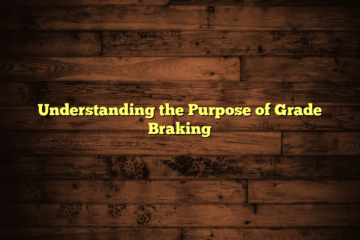Can Bad Struts Cause Shaking When Braking?
Yes, bad struts can cause shaking when braking as problems with the strut assembly can lead to vibrations in the vehicle. This shaking can be felt through the steering wheel and may be accompanied by unusual noises or uneven tire wear.
Additionally, worn suspension components, such as strut bearings, ball joints, and sway bar bushings, can also contribute to the vibrations. It is important to address these issues promptly, as they can affect the overall performance and safety of the vehicle.
By replacing the worn struts and related components, the shaking when braking can be resolved, providing a smoother and safer driving experience. Ensure to regularly inspect and maintain your vehicle’s suspension system to prevent such issues.
How Bad Struts Can Cause Shaking While Braking
Explanation of how a strut-style suspension is connected to the brake rotor and steering knuckle:
In a strut-style suspension, the brake rotor is mounted to the steering knuckle, which is connected to the strut. This means that any problems with the strut assembly can result in shaking while braking.
Impact of problems with the strut assembly on braking performance:
Having bad struts can affect braking performance. Worn suspension components like struts can cause vibrations, which can be felt through the steering wheel or heard as clunks when braking or steering. Additionally, worn strut bearings, ball joints, and sway bar bushings can all contribute to vibrations felt during braking.
Discussion on the relationship between bad struts and braking vibrations:
While bad struts might not directly cause vibrations during braking, they can contribute to other issues that result in vibrations. For example, driving with bad shocks can cause wheel hop, leading to abnormal tire wear, which can manifest as vibrations when braking.
It’s important to address any issues with the suspension, including struts, to ensure optimal braking performance and a smoother driving experience.
Signs Of Bad Struts And Their Effects On Braking
Signs of bad struts can include a shaking sensation while braking, nose dive when braking, bouncy ride, uneven tire wear, and vibration in the steering wheel. Bad struts can affect braking performance and should be checked and replaced if necessary.
| Signs of Bad Struts and Their Effects on Braking |
Bad struts can indeed cause shaking when braking. In a strut-style suspension system, the brake rotor mounts to the steering knuckle, which in turn, is connected to the strut assembly. If there are problems with the strut assembly, such as worn out struts, it can lead to vibrations in the steering wheel when braking. Additionally, worn struts may cause clunking noises during braking or steering. Another effect of bad struts is abnormal tire wear, which can be observed through uneven tire treads. It’s important to address these issues promptly, as they can impact the overall performance and safety of the vehicle. Regular inspection and maintenance of the suspension system can help identify and prevent issues with the struts. |
Other Factors That Can Cause Vibrations When Braking
Bad struts can indeed cause shaking when braking. Worn suspension components, such as the strut assembly, can lead to vibrations while braking due to the connection between the brake rotor, steering knuckle, and strut. This can result in a bumpy ride and potential issues with tire wear and steering.
Symptoms of worn struts also include nose diving when braking, uneven tire wear, and vibration in the steering wheel.
|
Frequently Asked Questions Of Can Bad Struts Cause Shaking When Braking?
Why Is There Really Bad Shaking When I Brake?
Bad struts can cause shaking when braking. In a strut-style suspension, the brake rotor mounts to the steering knuckle, which is connected to the strut assembly. If there are problems with the strut assembly, such as worn components or damaged strut mounts, it can result in shaking or vibrations when braking.
It is important to address these issues to ensure safe and comfortable driving.
What Are The Signs Of A Bad Strut?
Signs of a bad strut include nose diving when braking, a bouncy ride, vehicle rolling or swaying while cornering, uneven tire wear, rear squat during acceleration, vibration in the steering wheel, unusual noises, and leaking fluid on the exterior of shocks/struts.
Additionally, worn struts can cause vibrations and shaking when braking.
Can A Bad Strut Mount Cause Vibration?
Yes, a bad strut mount can cause vibration. Strut mounts connect the struts to the chassis and provide insulation. When damaged, they lose their ability to cushion noise and vibrations, resulting in excessive vibrations while driving.
Can Struts Cause Your Car To Wobble?
Yes, bad struts can cause your car to wobble while driving. Worn suspension components, such as struts, can lead to shaking and vibration, especially when braking or cornering. Signs of bad struts include uneven tire wear, a bouncy ride, nose dive when braking, and unusual noises.
It’s important to address these issues promptly to ensure your safety on the road.
Conclusion
Bad struts can indeed cause shaking when braking. The strut assembly plays a crucial role in the suspension system, connecting the brake rotor to the steering knuckle. If there are problems with the struts, such as worn strut bearings or ball joints, vibrations can be felt through the steering wheel when braking.
Additionally, damaged strut mounts can result in excessive vibrations while driving. Therefore, it is important to address any issues with the struts to ensure a smooth and safe braking experience.



